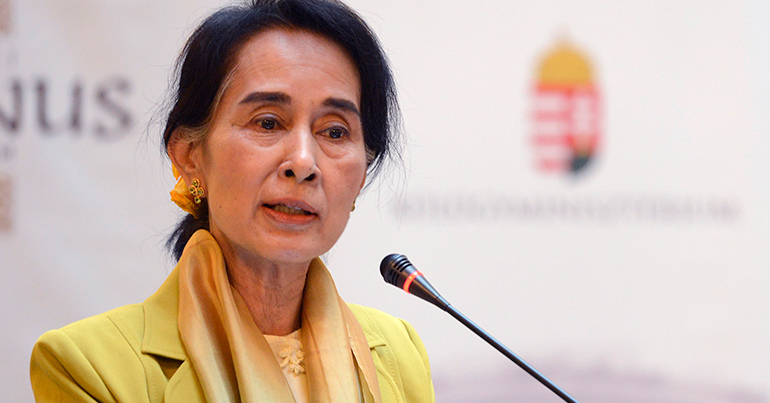The Myanmar leader’s peace accolade will not be rescinded even after the UN accused the country’s military and its leaders of denial and justification of anti-Rohingya violence

Embattled Myanmar leader Aung San Suu Kyi will be allowed to keep her 1991 Nobel Peace Prize, bestowed upon her for her pro-democracy efforts, the Norwegian Nobel Committee has confirmed.
“It’s important to remember that a Nobel prize, whether in physics, literature or peace, is awarded for some prize-worthy effort or achievement of the past,” said Olav Njoelstad, secretary of the Nobel committee. “Aung San Suu Kyi won the Nobel Peace Prize for her fight for democracy and freedom up until 1991, the year she was awarded the prize.”
Njoelstad also said Nobel rules prohibit the prize from being rescinded.
On Monday, the UN’s Human Rights Council released a report containing evidence, it said, of the Myanmar military’s “patterns of gross human rights violations and abuses” that “undoubtedly amounted to the gravest crimes under international law”. These violations include allegations that military forces slaughtered 25,000 Rohingya civilians, drove 700,000 Rohingya out of Myanmar, and committed systematic rape and torture of civilians as it destroyed and looted hundreds of villages.
The UN’s report, based on interviews with 870 survivors, satellite imagery, and photos and videos, accuses the country’s military of an array of crimes against humanity, and extends culpability to civilian leaders, who it said failed to speak out against the violence.
But there is a catch-22: The Myanmar government has denied the findings because UN personnel did not visit Rakhine state, the centre of anti-Rohingya violence – but that’s only because the government prohibited outsiders from entering Rakhine.
[manual_related_posts]
“That’s why we don’t agree and accept any resolutions made by the [UN] Human Rights Council,” said government spokesman Zaw Htay.
Last year, in the wake of the wave of violence and the resulting condemnation of Suu Kyi for failing to speak out, committee head Berit Reiss-Andersen confirmed that the prize would not be withdrawn. She said it’s up to recipients to maintain their own image after they receive it: “We don’t do it. It’s not our task to oversee or censor what a laureate does after the prize has been won. The prizewinners themselves have to safeguard their own reputations.”
